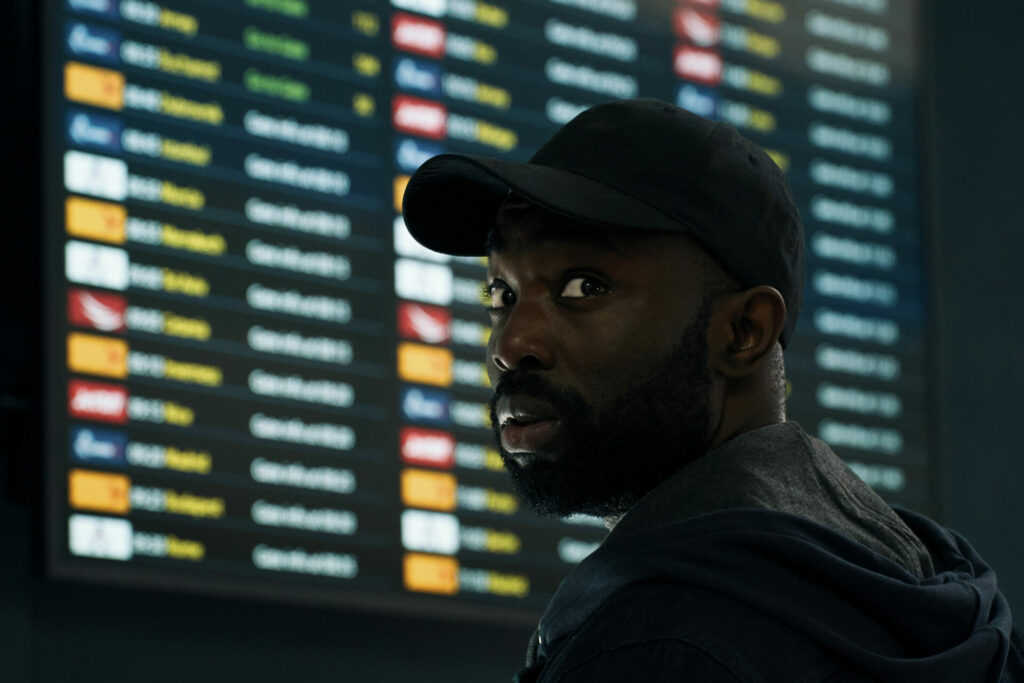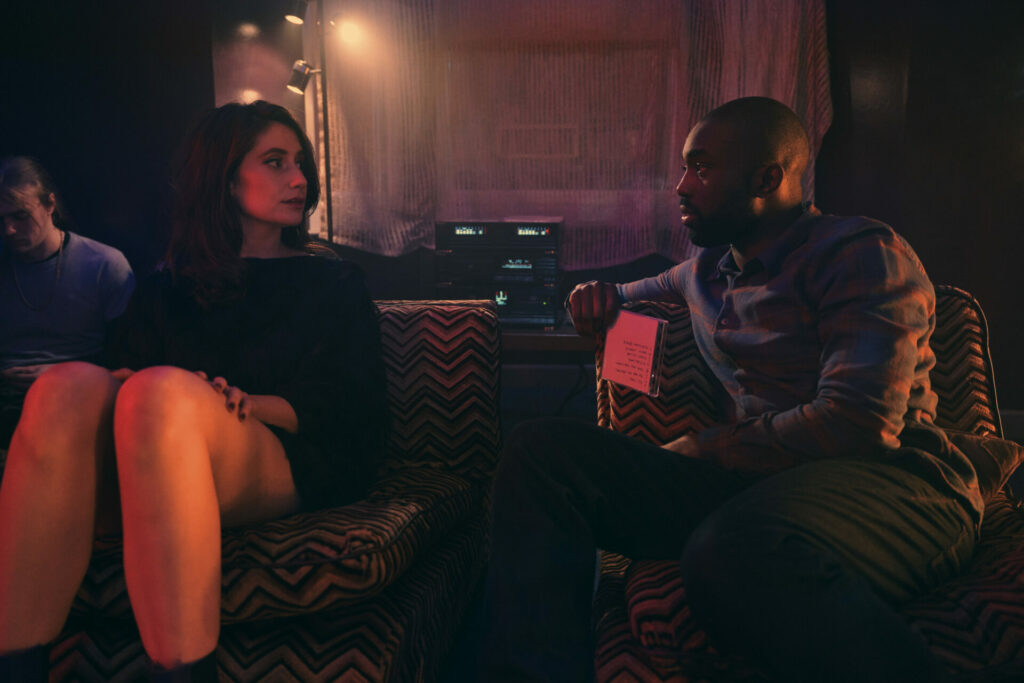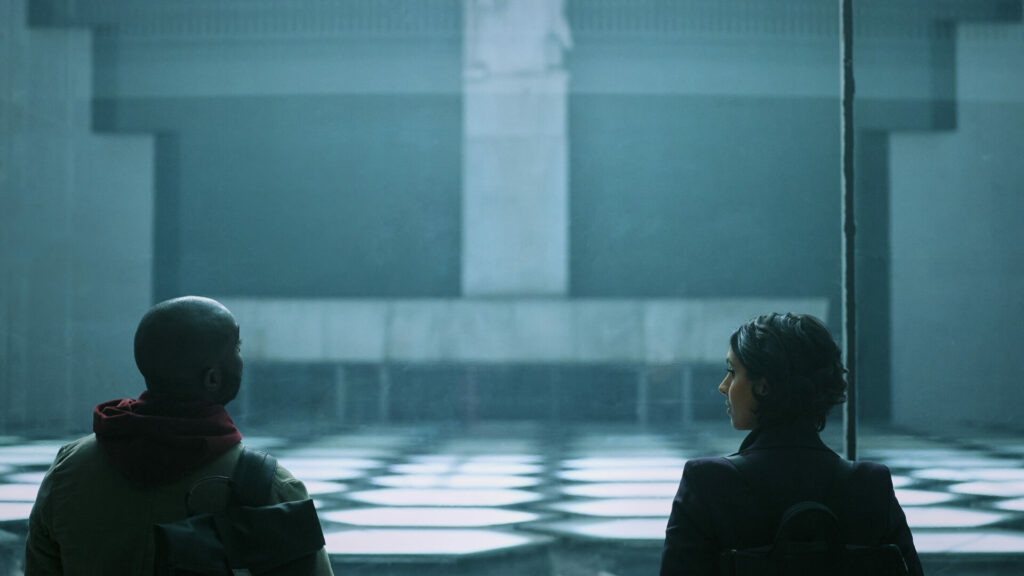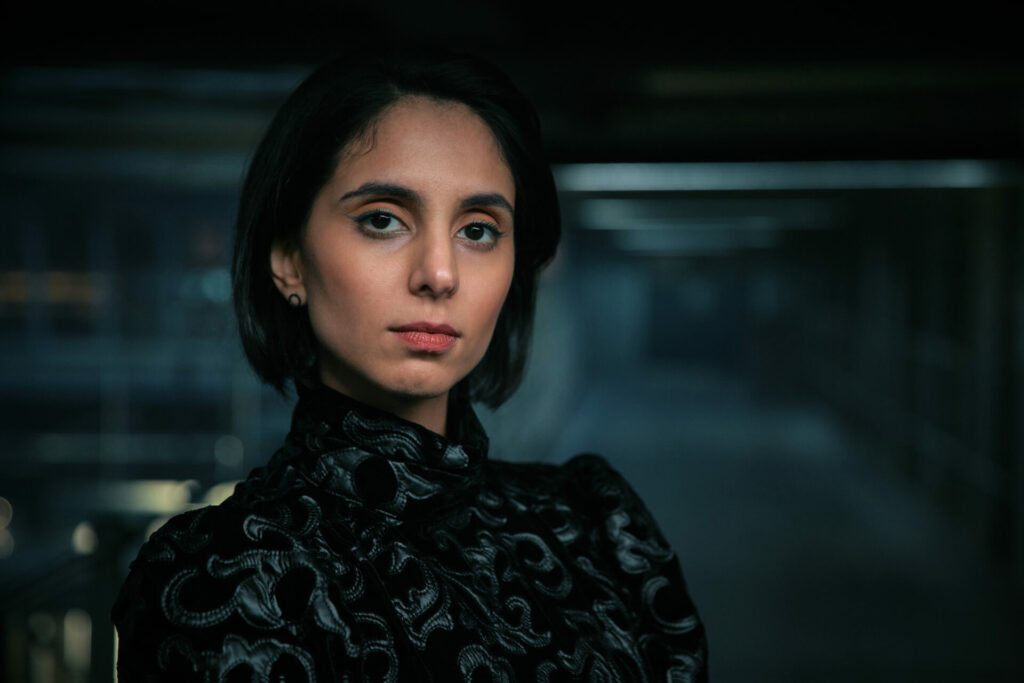‘The Lazarus Project’: the making of a mind-bending new British sci-fi show
The new series from ‘Giri/Haji’ creator Joe Barton is an action-packed sci-fi thriller with prescient themes. Rolling Stone UK speaks to Barton and stars Paapa Essiedu, Charly Clive, and Anjli Mohindra about how they kept such a labyrinthine plot grounded in real world emotions
By Sam Moore

Joe Barton, creator of Sky’s new ambitious sci-fi TV series The Lazarus Project, might be some sort of prophet. At the very least, he’s “too damn zeitgeisty for his own good”, according to one of the show’s cast, Anjli Mohindra.
Although Joe Barton penned The Lazarus Project six years ago, it’s taken on a prescience he could never have seen coming. The series, premiering tonight, concerns a man named George (played by I May Destroy You breakout star Paapa Essiedu) who’s entering a glorious time in his life – job success, marriage, babies – when a pandemic rips through the world as we know it. And yet one morning, he wakes up six months in the past – no pandemic, no marriage and certainly no babies – and he’s seemingly the only one to notice.
George is recruited into the Lazarus Project of the title, a secret organisation that is part-Torchwood, part-MI6, who use people with ‘abilities’ like George’s to turn back time to prevent extinction level events. In particular, nuclear armageddon looms large, just as it has come to again in the real world.
In a conversation over Zoom, Barton – who is best known for creating the BBC’s Japan-set cop show Giri/Haji – sees the humour in accidentally predicting the future, but stresses that the show comes from a very real place. “I feel like a pandemic has always been on the cards,” he says. “When I was writing I was thinking, ‘This will be fun, this will be a scary thing to watch.’ And then here we are.”
“I talked to this retired army colonel and asked him what’s the most realistic way for World War 3 to start, and he said exactly what’s happening now”
— Joe Barton, creator of The Lazarus Project
As for nuclear armageddon, that came from Barton’s ongoing fascination with the Cuban Missile Crisis and history’s many close calls with self-destruction. “There’s been this fear of nuclear since the ’40s and ’50s,” he says, detailing how his research led him down a rabbit hole that closely mirrors the current conflict between Russia and Ukraine. “I talked to this retired army colonel and asked him what’s the most realistic way for World War 3 to start, and he said exactly what’s happening now. The only difference was it was Estonia instead of Ukraine.”
Barton sometimes hit too close to the bone – when the war in Ukraine broke out in February, after production on The Lazarus Project had wrapped, “there was a lot of Russia and Ukraine stuff that we had to go back in and change with ADR [re-recording audio] and digitally removing flags. But this stuff has been bubbling over for a long time now.”

In the show, George is thrust into a dramatic world of espionage and time loops as well as personal tragedy as an accident rattles his moral compass and bends him to harness his new power in ways that may put the world at risk. Paapa Essiedu describes his character as “an ordinary man that finds himself in an extraordinary situation, and this extraordinary situation becomes increasingly extraordinary”.
Following his BAFTA nomination for I May Destroy You, Essiedu was finding himself on a lot of writer, director, and producer’s wishlists, but he felt personally swayed by The Lazarus Project and the drive of its creator creator. “I wanted to do something that felt different and authentic,” he says. “I didn’t want to repeat something I’d done before. I was really taken by the ambition of the storytelling.”
Surrounding Essiedu is a cast of Britain’s best and brightest. There’s Pure’s Charly Clive as George’s partner Sarah; Bodyguard’s Anjli Mohindra, playing cerebral agent Archie; Tom Burke as former Lazarus agent-turned-supervillain Rebrov; and TV legend Caroline Quinton as unflinching Lazarus leader Wes.

Such an ensemble was only possible due to the cast’s reverence for main man Barton and his past work – mainly his Kelly Macdonald-starring thriller Giri/Haji, which Essiedu says is unlike anything “the BBC have made before or since”. Without blinking, Mohindra calls Barton “a genius”, while Charly Clive, who has written for stage and TV herself, adds that his scripts were “like reading a novel”.
Much of the first two episodes are relatively low-key, largely taking on the form of a relationship drama (to the point where Clive initially thought she was auditioning for a rom-com) with a Groundhog Day twist before exploding into action scenes on a scale rarely seen on British TV.
“I wanted to do something that felt different and authentic. I didn’t want to repeat something I’d done before. I was really taken by the ambition of the storytelling”
— Paapa Essiedu, star of The Lazarus Project
Those action scenes make liberal use of firearms. Mohindra admits she initially found the experience of being around live guns “terrifying”, but used her weapons training as a way to get into her character, which she describes as a hybrid of M and the Doctor. “There was something so powerful about having it in my hand; I didn’t want to give it back,” she says. The weapons trainers, she says, are “like human shotguns. They can do it with their eyes closed. So you have to find that comfort. I kept blinking when I was shooting because the gun is so loud, but I wanted it to be as seamless as possible.”
Essiedu, too, takes time to shout out the stunt team, who help pull off the show’s marquee sequences. He’s generous towards his co-stars and colleagues in other ways, too, at his most animated when bigging-up Charly Clive as “brilliant”, along with a number of other superlatives. The feeling is returned in kind: “I want people to watch it and see how extraordinary our leading man is because we all felt that,” says Clive. “He was on set every single day for six months during a pandemic.”

The off-screen closeness between the two reflects onto their characters who have an authentic chemistry. Building George and Sarah’s relationship was of paramount importance to Essiedu and Clive, to get the audience to buy into the increasingly crazy plot dynamics that shifts the show into globe hopping thriller that is still a love story at its emotional core. “Me, Charly and Joe put a lot of time thinking how to make this relationship as authentic as possible,” Essiedu says. “We’ve all been in love and we all know what it’s like to feel you would do anything for the person you love.” Clive adds that lockdown conditions heightened their closeness: “It was only me, Paapa and a few crew members, so we got to play house, basically.”
“[Because of lockdown] it was only me, Paapa and a few crew members [on set], so we got to play house, basically”
— Charly Clive, co-star of The Lazarus Project
The rest of The Lazarus Project is a whirlwind of plot twists and time loops and video game-like checkpoints that actually plays a lot easier than it sounds. Despite the heavy themes and labyrinth plotting, the show is accessibly populist. With the show touching on pandemics and thrusting the viewer into geopolitical conflicts involving nuclear weapons, it has the cast and crew speculating on how audiences will react when it premieres. Most shows over the last two years have avoided Covid completely, and most shows going forward will ignore the burgeoning threat of nuclear war. But Mohindra says that The Lazarus Project gets it right when it tackles these ideas head-on.
“This is the real world and these things are happening,” she says. “Why hide away from them? I think it’s important that we reflect the world we live in.”
The Lazarus Project premieres on Sky Max tonight (June 16) at 9pm
